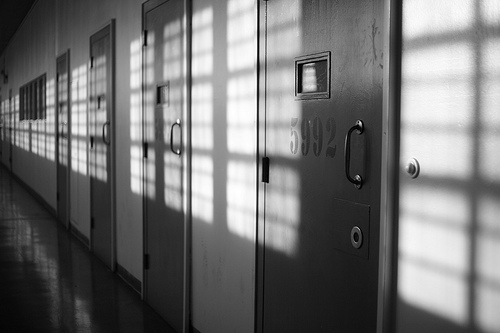 COLOR LINES– What began as a hunger strike among inmates of the isolation wing of California’s Pelican Bay prison has turned into a statewide display of solidarity. A number of prisoners in Pelican Bay’s Security Housing Unit, California’s highest-security complex, refused their state-provided morning meal on Friday to protest the inhumane conditions of their confinement. Inmates in the Security Housing Unit spend 23 hours per day in soundproofed, windowless cells. Their daily hour of exercise is walking around a small, walled space. The intent is to keep prison-gang members and those considered dangerous to others separated from fellow inmates.
COLOR LINES– What began as a hunger strike among inmates of the isolation wing of California’s Pelican Bay prison has turned into a statewide display of solidarity. A number of prisoners in Pelican Bay’s Security Housing Unit, California’s highest-security complex, refused their state-provided morning meal on Friday to protest the inhumane conditions of their confinement. Inmates in the Security Housing Unit spend 23 hours per day in soundproofed, windowless cells. Their daily hour of exercise is walking around a small, walled space. The intent is to keep prison-gang members and those considered dangerous to others separated from fellow inmates.
Despite original claims by the California Department of Corrections and Rehabilitation that the hunger strike was limited to fewer than two dozen Pelican Bay inmates, spokesperson Terry Thornton said yesterday that the weekend had seen a peak of 6,600 protesters. According to Thornton, there are currently around 2,100 prisoners declining meals. Thirteen of California’s 33 penal facilities have counted protesters among their inmate populations and it appears that the sentiment of solidarity is spreading beyond state borders. On Friday, a number of those incarcerated at Ohio State Penitentiary refused their food trays for a full 24 hours.
Molly Porzig, spokesperson for Critical Resistance, an organization dedicated to developing alternatives to incarceration, highlighted the significance of the strike’s timing. “California has been ordered by the Supreme Court to release prisoners due to the neglect and overcrowding in the state’s prisons. They recognize that the conditions of California’s prisons are absolutely atrocious.” Additionally, Porzig pointed to the state’s recent budget, which includes $140 million in overtime for guards, especially those in SHUs. “California is demonstrating that it prioritizes prisons over education, parks, health care, keeping our libraries’ doors open and other things that our communities need.”
The strikers’ demands include better food, warmer clothing and a phone call each month. They also hope to end the unit’s debriefing policy, which allows inmates to leave the unit in exchange for information about the actions of other gang members and prisoners. “Its an incredibly dangerous system for prisoners and their families because of retaliation,” said Porzig. “On the other end, all someone needs to do is point a finger at you and you’re in SHU indefinitely.”
Read more about Thousands of CA Inmates on Hunger Strike.
This video explains what the Pelican Bay Hunger Strike is all about,
with former prisoners detailing why prisoners are protesting, how this
action relates to a history of prisoner-led resistance, and what people
outside prison can do to support the hunger strike.
This video
was made by a coalition called Prisoner Hunger Strike Solidarity. For
updates on the hunger strike, check out:
prisonerhungerstrikesolidarity.wordpress.com
© 2011 Color Lines
Photo by Flickr User Ben Kraus










